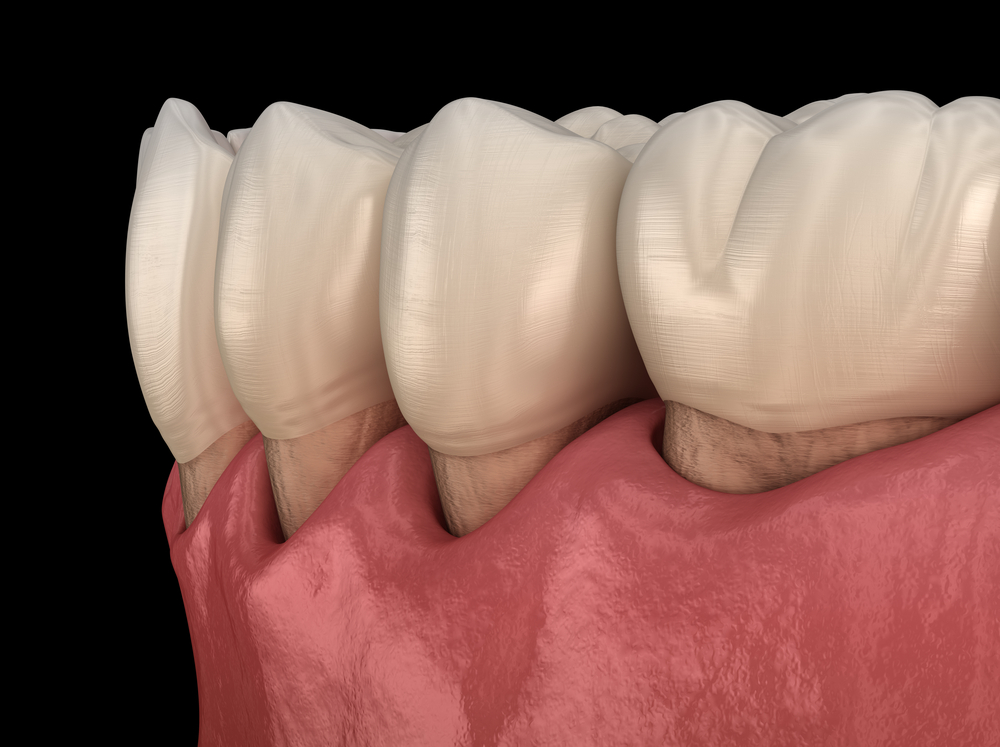What’s The Best Way to Floss
We all know we should floss, but it can be tough. Part of this is because flossing can feel like an extra task in an already busy day, but it...

When the tissue that usually covers your teeth’ roots starts to pull back, it’s known as gum recession. Although it does affect the appearance of your smile, gum recession isn’t just a cosmetic issue. The sooner gum recession is caught, the easier it is to treat and reverse the damage because receding gums won’t regenerate on their own.
Several factors can cause your gums to recede, including:
Poor Oral Health – Regular brushing and flossing help prevent plaque from building up on your teeth’ surface, which then turns into hard deposits called tartar. Poor oral health encourages plaque to develop, which then leads to gum disease and gum recession.
Aggressive Brushing – Brushing your teeth with too much force can wear away your tooth enamel in addition to making your gums recede.
Genetics – Much like the rest of your body, how your gums look and feel are determined by your genetics. If members of your immediate family suffer from gum recession, you may be at a higher risk.
Tooth Position – Teeth that are misaligned are more likely to develop gum disease than an aligned bite.
Teeth Grinding – Bruxism is a habit that can create many dental issues, including gum recession, tooth sensitivity, excessive wear on the teeth, and in extreme cases, loose teeth and fractures. Many useful options, such as wearing a mouthguard while you sleep, help prevent or treat teeth grinding.
Tobacco Use – Smoking and tobacco use increases your risk for receding gums. The CDC recommends quitting all tobacco use to protect your teeth and gums.
While a few signs are easy to spot for yourself, it’s not always easy to spot gum recession. The best way to avoid undetected gum issues is to have regular check-ups with your dentist. Professional cleanings and exams allow us to identify and treat gum disease as soon as possible.
Long Teeth
Seeing your teeth visibly lengthen is an indication of periodontal disease. If your teeth start to appear much longer than they used to, speak with your dentist right away.
Exposed Tooth Roots
If your teeth’ roots are exposed, it can lead to extreme sensitivity and discomfort along the gum line. Brushing aggressively or using a toothbrush with hard bristles can contribute to the development of periodontal disease.
Loose Teeth
If you ever notice your teeth feeling loose, it may result from the bacteria and periodontal disease under the gums around your teeth. As receding gums worsen, the gum pockets deepen, and the teeth’s attachment decreases.
Mild gum recession can be effectively treated by a professional deep cleaning in the affected area. During the deep cleaning, plaque and tartar buildup will be removed, and the exposed root area is polished. This process makes it more difficult for bacteria to attach themselves to the treated areas. Antibiotics may be recommended to kill any remaining bacteria. Gum surgery may be required if a professional deep cleaning is not sufficient in treating the condition due to excess loss of bone and deep pockets.
There are a few simple and effective ways that you can ensure excellent gum health at home. If you’re concerned over your gums’ health, try incorporating the following into your oral hygiene routine.
Maintaining good oral care habits, such as brushing twice a day and flossing daily, can prevent gum recession from gingivitis. While your hygiene habits won’t correct the existing gum recession, it will help to prevent further recession from taking place. If you have started to notice your teeth looking long, or your gums pulling back from your teeth, don’t wait to see your dentist.
Hoffman Dental Care is here to help you combat gum recession. Contact us today for more ways to improve your oral health.